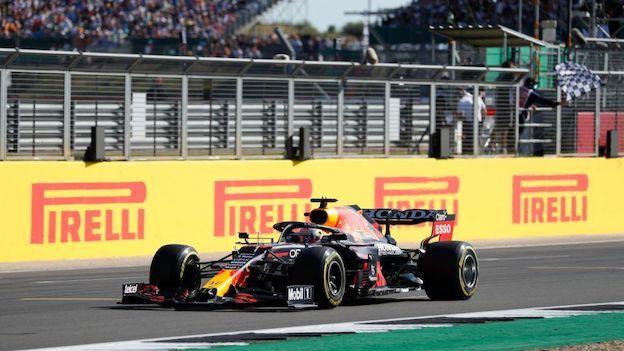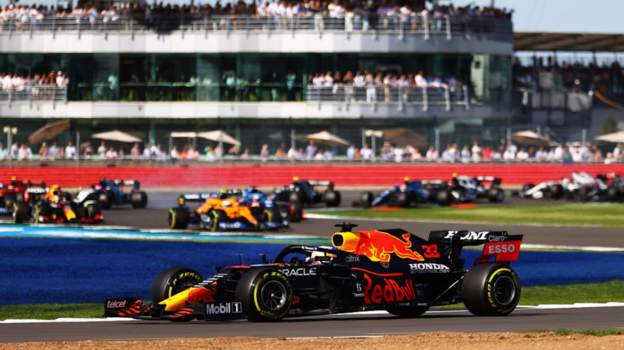
Formula 1’s new ‘sprint’ format could eventually become the standard approach to a grand prix weekend, says managing director Ross Brawn.
Brawn said F1 “wants to take progressive rather than radical steps” with the format.
But he said there was “no reason” why having a one-third distance race in addition to qualifying and the grand prix could not be used at all events in future.
“It’s open. It could evolve that way, but if it does, it will be because it’s the best thing to do,” Brawn said.
F1 has in principle agreed with teams and governing body the FIA to increase the number of ‘sprint’ events to six next year, and they are assessing how to modify the format to reflect the lessons of this year, as previously reported by BBC Sport.
“We are taking it carefully step by step and off the back of six you can decide whether you want to increase the number,” Brawn said.
“I don’t think we should be afraid of doing that because, if we did that, it would be a measure of the success of the sprint. And if that is the format for the future then we have gone about it the right way.
“Equally, we may conclude that having it as a showcase event adds interest to the season.”
He added no firm decision would be made “until we get there and we can measure the responses”.
What is a ‘sprint’ event?
The ‘sprint’ format has been introduced at three grands prix this season in an attempt to add extra entertainment value to the weekend.
It moves qualifying to Friday to set the grid for the ‘sprint’ on Saturday. The result of this race – one-third the distance of a grand prix – sets the grid for the main event.
Brawn said F1 bosses and teams were evaluating the success of the new format, which has featured at the British and Italian races, with one more to come in Brazil this month.
And he emphasised: “The trick is to make sure we never cannibalise the main event. We want to enhance that, so we are mindful of not detracting from the Sunday event whatever we do.”
What could change next year?
Brawn said that the decision to award pole position to the winner of the sprint race rather than the fastest driver over one lap was a mistake and that this had “clearly not been popular” with fans and drivers.
Among other matters likely to change are increasing the number of points available to enhance the drivers’ desire to attack and race.
Brawn said he wants to increase the points on offer from the current three-two-one for the top three to an equivalent of about one-third of the points awarded for the main grand prix, and to a larger number of drivers.
Another option is to separate out the ‘sprint’ completely and make it a stand-alone event, by making qualifying set the grid for the grand prix as normal and decide the sprint-race grid another way.
Brawn said that while he was keen to introduce grids in reverse championship order for this, he felt that would “perhaps be a step too far” next year.
And he said one main reason for being cautious into 2022 is that F1 is introducing a major change of technical rules aimed at improving the racing, by making the cars more capable of following closely and overtaking.
“The overall weekend has improved so much we will go with it, but we are discussing with the teams how to make a bit more Saturday more challenging and engaging,” he said. “I am optimistic the new cars will help because of their ability to race each other.
“We are going to be relatively conservative in the step we’ve made. We don’t want to spoil it by overstepping and people feeling it’s gone too far.”
He said the races at which the six sprint events would be held next year had not been decided – although at least one of them is again expected to be the British Grand Prix – and he said another option being considered for the future was to make a ‘sprint’ champion, awarded only on the points scored in the shorter-format races.
Feedback from drivers and fans
Brawn said the biggest positive of the new format was that Fridays had been made much more relevant – on a standard weekend, there is no competitive action on a Friday, only two hours of free practice for the teams to set up their cars.
“To be frank, we’ve had a bigger impact on the Friday than we anticipated,” Brawn said. “That’s why we’re doing this experiment.
“Talking to the drivers about the sprint, they’ve said Friday is great now because they get in and get an hour of practice and they have to go for it. Friday had pretty uniform support from most of the drivers. The only ones who were a little apprehensive were the rookies who didn’t get as much running as they might have enjoyed.”
Brawn admitted the “avid fans have not been convinced yet – they are indifferent – but the majority of our ‘normal’ fans were positive about the concept”.
